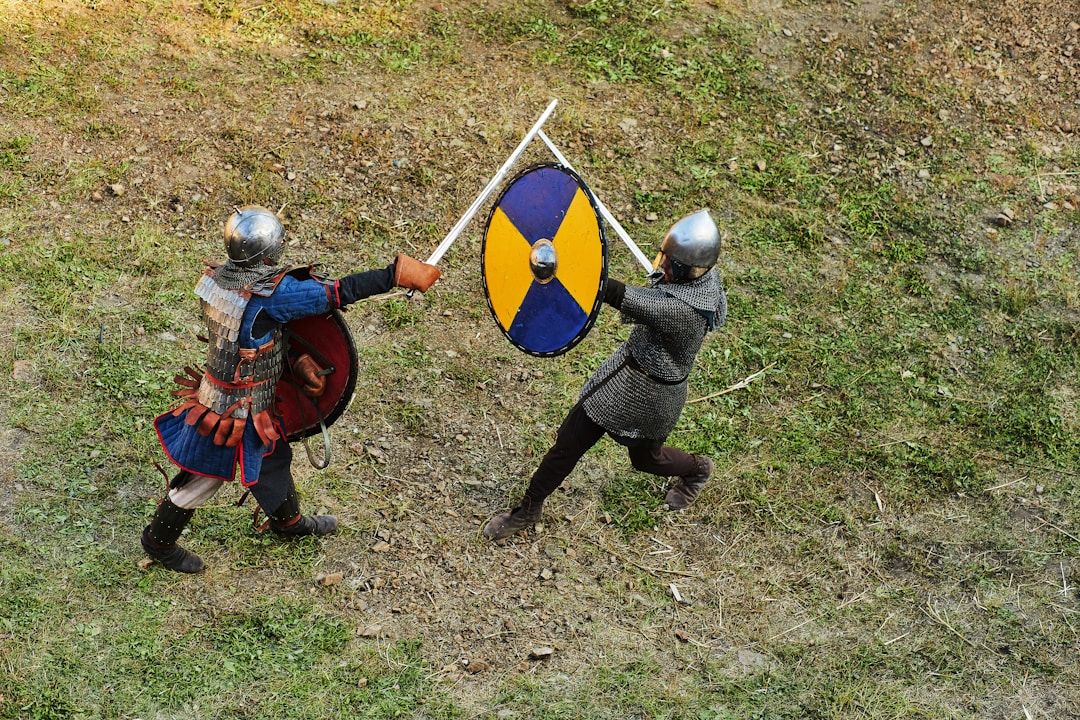
Fourth Week of Easter
Not Peace But the Sword?
What we've been exploring about peace with others is all well and good, but did Jesus actually preach this peace? After all, he said this to his apostles:
"Do not think that I have come to bring peace upon the earth. I have come to bring not peace but the sword. For I have come to set a man 'against his father, a daughter against her mother, and a daughter-in-law against her mother-in-law; and one’s enemies will be those of his household.'" — Matthew 10:34-36
That certainly doesn't sound peaceful! However, if we look more closely, we'll see that this passage doesn't contradict what the New Testament teaches us about peacemaking.
"Do not think that I have come to bring peace upon the earth. I have come to bring not peace but the sword. For I have come to set a man 'against his father, a daughter against her mother, and a daughter-in-law against her mother-in-law; and one’s enemies will be those of his household.'" — Matthew 10:34-36
That certainly doesn't sound peaceful! However, if we look more closely, we'll see that this passage doesn't contradict what the New Testament teaches us about peacemaking.

Context is key, so the first place to look is the next part of the same passage:
“Whoever loves father or mother more than me is not worthy of me, and whoever loves son or daughter more than me is not worthy of me; and whoever does not take up his cross and follow after me is not worthy of me. Whoever finds his life will lose it, and whoever loses his life for my sake will find it." — Matthew 10:37-39
Because he is our Creator and Redeemer, Jesus justly demands our highest love. Put another way, we cannot rightly love anything more than him, not even our families or our own lives. This kind of radical love for God is the only thing that can bring peace within ourselves or, ultimately, between people.
However, in the meantime, prioritizing love of God provokes opposition. People, ideologies, governments, and the like don't like being told they're coming in second to anyone, not even God. The total love of God that Jesus calls for can and does cause divisions in families and societies. We should do what we can to avoid discord, but if we subordinate our love of God to anything in order to make peace, we abandon the very foundation on which true peace can be built.
“Whoever loves father or mother more than me is not worthy of me, and whoever loves son or daughter more than me is not worthy of me; and whoever does not take up his cross and follow after me is not worthy of me. Whoever finds his life will lose it, and whoever loses his life for my sake will find it." — Matthew 10:37-39
Because he is our Creator and Redeemer, Jesus justly demands our highest love. Put another way, we cannot rightly love anything more than him, not even our families or our own lives. This kind of radical love for God is the only thing that can bring peace within ourselves or, ultimately, between people.
However, in the meantime, prioritizing love of God provokes opposition. People, ideologies, governments, and the like don't like being told they're coming in second to anyone, not even God. The total love of God that Jesus calls for can and does cause divisions in families and societies. We should do what we can to avoid discord, but if we subordinate our love of God to anything in order to make peace, we abandon the very foundation on which true peace can be built.

Peace with others cannot be bought at any cost. We cannot sacrifice the truth or violate God's law in order to avoid a fight. Such an effort will only backfire on us. Therein lies the difference between peacemaking and simply being nice. Jesus didn't say "Blessed are the nice, for they will not offend anyone." Niceness may seem like the quick and easy path to peace, but it cannot deliver on its promise the way that faithfulness to God's truth, goodness, and beauty can.
Inevitably, we have to accept some unavoidable conflicts in this age in order to gain God's peace in the age to come. If we do, we will begin to experience peace with God and others even here and now.
Inevitably, we have to accept some unavoidable conflicts in this age in order to gain God's peace in the age to come. If we do, we will begin to experience peace with God and others even here and now.
Grant, O Lord, that we may begin with holy fasting this campaign of Christian service, so that, as we take up battle against spiritual evils, we may be armed with weapons of self-restraint.
This collect prayer begins the Mass for Ash Wednesday, the first day of Lent. Jesus is calling us to "take up battle against spiritual evils." We'll explore fasting itself in a few weeks; during the week of Ash Wednesday, we're going to dig into an important set of weapons the Lord gives us to fight evil: sacramentals.
What's a sacramental? Well, if you attend Mass on Ash Wednesday, you're probably going to receive one on your forehead.
This collect prayer begins the Mass for Ash Wednesday, the first day of Lent. Jesus is calling us to "take up battle against spiritual evils." We'll explore fasting itself in a few weeks; during the week of Ash Wednesday, we're going to dig into an important set of weapons the Lord gives us to fight evil: sacramentals.
What's a sacramental? Well, if you attend Mass on Ash Wednesday, you're probably going to receive one on your forehead.

A Ministry of Our Lady of the Lake Catholic Church
480 152nd Avenue, Holland, MI 49424
lanecatholic@oll.org
Privacy Policy and Terms of Use
Copyright © 2025